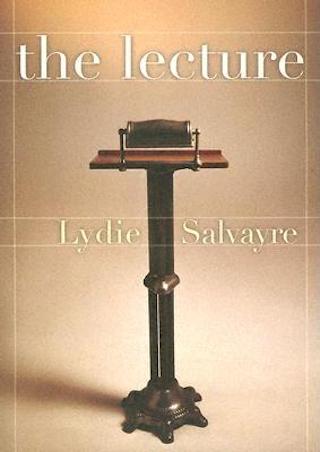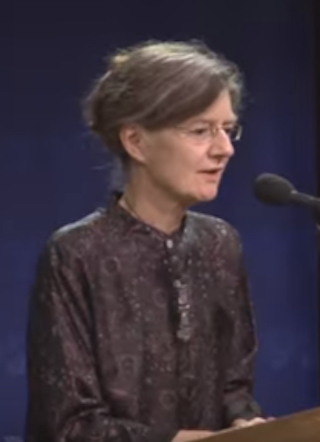“The Lecture” by Lydie Salvayre and Linda Coverdale [Excerpt]
 Today’s #WITMonth post is an excerpt from The Lecture by Lydie Salvayre, translated by Linda Coverdale, a wonderfully funny and playful French writer who Dalkey published for quite a while (The Power of Flies, Everyday Life, The Company of Ghosts, Portrait of the Writer as a Domesticated Animal), and might again! Warren Motte has written about her on several occasions (stay tuned for a deeper read of her work from him), and I remember being absolutely delighted by Linda Coverdale’s rendition of the voice of this quirky, self-deluded, sad lecturer who is hiding his grief behind a pompous lecture for his campaign to correct the ills that have overtaken France and make the art of conversation great again.
Today’s #WITMonth post is an excerpt from The Lecture by Lydie Salvayre, translated by Linda Coverdale, a wonderfully funny and playful French writer who Dalkey published for quite a while (The Power of Flies, Everyday Life, The Company of Ghosts, Portrait of the Writer as a Domesticated Animal), and might again! Warren Motte has written about her on several occasions (stay tuned for a deeper read of her work from him), and I remember being absolutely delighted by Linda Coverdale’s rendition of the voice of this quirky, self-deluded, sad lecturer who is hiding his grief behind a pompous lecture for his campaign to correct the ills that have overtaken France and make the art of conversation great again.
The Lecture is available from better bookstores everywhere, Dalkey’s website, Bookshop.org, or wherever you get your books.
Take a French dinner party. In Paris. Chez Armand. A chic dinner. The kind I don’t go to. Pearls, crystal, the works.
Observe the guests. Scientifically. They turn to the left and right. Shake their heads. Gesture repeatedly with their right arms in a manner known as pronation. Devote themselves to mastication, mouths closed, I should add. And between two tiny mouthfuls, I should add, they move their lips constantly. Like this.
Because for them, ladies and gentlemen, conversation has replaced everything else. They neither laugh nor belch. Belching went out of fashion with regicide. That’s the remark my brother-in-law made just to mortify me. At the table. In front of everyone. The day of the funeral. As I was choking back a hiccup between two sobs.
In the time of the Bourbon Louis, he announced with ludicrous pedantry, there was an official called the hastener who was in charge of the king’s belches. Sometimes the king’s belch was slow in coming, and all the courtiers would wring their hands, quiver with impatience, and turn sorrowful countenances toward the royal valve: But let him hasten, then, let this hastener hasten the sacred belch of the king! The hastener and his king have been done away with. And belchery with them. Those are great losses indeed.
Still, I thought, not so great as Lucienne’s death. Forgive me, but my grief is as fresh, if I may say so, as a vegetable. I said vegetable. I really shouldn’t have. That’s the word I often use to evoke her, so calm, so—how shall I put it—so superbly lumpish. But let us stifle our grief. And let us return to that dinner party with which I opened my lecture. We may conclude, from our thorough investigation, that while it is generally admitted that speech is the achievement of all mankind, conversation is a specialty that is eminently French.
*
conversation is a specialty that is eminently French.
*
That is our first and most heartening axiom. A specialty, I emphasize this, that is not exportable. Because it is not merchandise. It is even quite the opposite. I shall come back to this essential point. At the proper time. With the methodical turn of mind that is my wont.
We French, I was saying, are champions at conversation. This distinguishing trait, long elevated to the status of a national virtue, made the reputation of France and secured its reign.
Well, that art at which we excel is today in peril. I am sounding the alarm in our little town in hopes of alerting the highest authorities. Mediocrity, ladies and gentlemen, is going international. The fear of offending prevails more and more over the taste for talking. A generous spirit is discredited, if not condemned outright. It is taken for weakness of intellect. From one end of the planet to the other, conversations are all the same. Their poverty of ideas is now in fashion. And their insipidness is sickening.
*
Conversation is going downhill.
*
That will be our second and most distressing axiom. We live, increasingly, without talking to one another. Is no life, then, worth the telling? We live without talking to one another and soon we will live without living, which gives me the shivers.
Conversation is going downhill and the country with it, they go hand in hand. And it is greatly to be feared, if nothing is done, that they will both wind up in the garbage. The vultures will finish the job. You can count on them.
So here, dear ladies and gentlemen of Cintegabelle, is my rescue plan, conceived in the utmost urgency and which I unhesitatingly declare to be of national utility, since by proposing to restore the luster of speech in the eyes of a world that has forgotten how to speak, it aims at nothing less than the civic renewal of our country and the polishing of its image so that, I’m catching my breath, so that, strong in its recovered prestige, the France of tomorrow may assure throughout the world the civilizing mission that has fallen to her from time immemorial. Might I ask you, children, to please stop snickering. And to stop moving your chairs around. It’s irritating.
The subtle art of conversation, however—to which, I venture to say, I have devoted my genius—offers, aside from that patriotic virtue I have just mentioned, other advantages no less excellent albeit less directly civic. And which to my astonishment have not yet been the object of any detailed study.
The first of these advantages is that conversation is very useful for seducing women.
The second is that it’s even handier for succeeding in society.
The third and most surprising is that in bringing joy to mankind, it contributes appreciably to reducing the deficit of the National Health Service. A subject of satisfaction for our government.

Lydie Salvayre
In the interest of clarity, my lecture will scrupulously observe each step of the following outline, which I ask you to please keep in mind.
Part One: The advantages of conversation, already noted, and upon which we will elaborate with a most mathematical rigor.
Part Two: Those conditions favorable to the flowering of conversation, which are ten in number:
—the presence of at least two persons;
—the comfort of the derrière;
—the ability to keep silent;
—courtesy;
—clarity;
—jocularity;
—the principle of equality;
—a sense of proportion;
—an insouciant disregard for time;
—freedom.
Part Three: Five examples of conversation selected from among the most common categories:
—amorous conversation;
—literary conversation;
—political conversation;
—patriotic conversation;
—conversation with the dead.
The whole thing enlivened by a number of axioms with which I am not at all displeased. I’m rather fond of axions.
*
So, Part One: The advantages of conversation.
The first of the advantages of conversation, as I was saying, and not the least of them, is that conversation always finds remarkable favor with women. Every last one of them goes into raptures before a clever conversationalist, be he cross-eyed, pot-bellied, warty, a journalist, or deformed. Take me: noticeably ill-favored, with big ears, and a cowlick I spend hours plastering down, I was an immediate hit with Lucienne (a woman impervious to poetry and little given to linguistic acrobatics) the second I began to babble. And I must confess that my verbal vivacity and florid declarations (I commanded, at the time, a whole battery of tricks, classified by genre) did more to lift up her redoubtable skirt than any fumbling gesture I’d never have dared make anyway. I wasn’t that stupid. And kew for a fact that
*
women’s genitals communicate with their ears.
*
If, gentlemen—for it is to you, men of Cintegabelle, that I speak—if nevertheless you prove unable to resist the summons of the flesh, if you are seized with the desire to place your hand on the knee of an altogether too concupiscible woman, I urge you most emphatically: under no circumstances interrupt your harangue. Without ceasing to chatter, keep gaining ground. Advance stealthily and with ingratiating ploys. Like the sinuous serpent of desire. Pursue your reputation garlanded with pretty turns of phrase. In perfect synchrony, lay compliments at her feet and hands on her modesty. From poems to promises, from promises to prattle, you will proceed without mishap to the inevitable place. Once there, stop talking! Pounce!
The second advantage of conversation concerns in particular those scheming, bloodthirsty youths who crave a brilliant career in the Arts and Letters. You will find such young men everywhere, and our town is no exception.
That’s right, my little wolf cubs in the first row, I’ll have you know that you will achieve more through a funny remark, a turn of phrase, or a flash of wit than through your girlfriend’s sex appeal, a complete familiarity with the twelve volumes of Quintilian’s De Institutione Oratoria, and even the outstanding dishonesty that in France ranks demonstrably among the most important factors of success.
You see, I have a friend (who shall remain nameless), a regional writer, an expert on the arts and crafts of Languedoc, who, whenever he goes out in society, flounders, stammers, stares like an idiot at his perfectly ordinary shoes, and can only bleat “Ah” and “Oh” and “Uh” and sometimes “Hee-hee.” Now, although each of these onomatopoeias contains a world of perplexity and terrifying apprehension, they do absolutely nothing to fuel the fires of literate conversation. As for the few times when this friend is invited to appear on a television program, it’s just pitiful to hear him sputter away! Result: he gets no name recognition, as the rabble say.
*
Lousy conversation is social suicide.
*
Through a quite common misunderstanding, his poor speaking skills make a poor impression on people, whose low opinion of him we find most unfair. But the world is made in such a way that
*
it is not enough to be talented,
one must also look the part.
*
This will be our inevitable axiom. The corollary to which is equally inevitable:
*
To appear to be what one is not is ridiculous,
like dressing up a monkey in a three-piece suit.
*

Linda Coverdale
Or wearing one myself. The results are guaranteed!! am grotesque. Lucienne always told me so. She preferred me in a track suit. To my great sorrow. So is better, it seems, to suit one’s style to oneself. And what’s more, one must know one’s own style. And oneself. And how to make them work together. All that isn’t easy. I feel I’m getting bogged down. Which happens whenever I try to think. I see no other way to land on my feet again (one couldn’t dream up a more appropriate expression), no other way than to quote Baltasar Gracián, a philosopher whom I’ve discovered since my Lulu left me (mourning has its good points, you must admit).
When the bottom has fallen out of everything, this thinker wrote, nothing can replace it. And although you can spruce up what the English refer to as the “packaging” (it’s me speaking now), try as you may to decorate the emptiness with ruffles, doll it up, swathe it in tissue paper, beribbon it with fancy words and frills, the emptiness stubbornly, imperturbably, remains. I will let you meditate a moment on what I’ve just said, before issuing the following warning.
Warning:
Whoever considers the subtle art of conversation simply a useful skill for social climbing is a fool and a cipher. For conversation presupposes, ladies and gentlemen (before swelling into chamber music, or jazz, or rock, depending), an incubation period when the riches of the mind ferment, I don’t like that image because it reminds me of cheese, whereas, we’ll get back to this, conversation is not a cheese, another French specialty along with champagne and the famous spirit of collaboration, and if we absolutely had to find a metaphor here, I’d propose that
*
conversation is a wine that improves with age.
*
Which means that in my eyes, it possesses every virtue.And not only does it not preclude either thought or culture. Which are not acquired in one day. Or a hundred. Or a thousand. Lucienne, for example, barely attained their outer edges. And died as lightweight as the day she was born. I’m not speaking of her body, that poor shell, but of her soul, which had the thickness of a blotter. And not only, as I was saying, does conversation not preclude either thought or culture. It positively requires them. Sanctifies them. And celebrates them. Just listen to me, for instance.
The preceding assertion might seem like a perfidious attack against certain modern writers whose profundity of thought and cultural capital—I love that last expression, simply saying it makes me feel rich, but not for long—whose cultural and more particularly syntactic capital is limited to pocket change. But God forbid we should wish them harm! Every poor man is our friend!

Leave a Reply